GCE A-Level results: Student had to learn how to eat, walk and write again after being diagnosed with brain condition
SINGAPORE — A year after he won the school’s Sportsman of the Year award for his achievements in taekwondo, Jurong Pioneer Junior College student Lim Yong Jin never thought he would have to learn how to eat, walk and write again.
SINGAPORE — A year after he won the school’s Sportsman of the Year award for his achievements in taekwondo, Jurong Pioneer Junior College student Lim Yong Jin never thought he would have to learn how to eat, walk and write again.
But that was what happened after he was diagnosed in September 2018 with autoimmune limbic encephalitis, a disease characterised by an inflammation of parts of the brain and is caused by autoimmunity — where the body produces antibodies against itself. It may cause cognitive impairment, seizures and short-term memory loss.
The 21-year-old was one of the 12,405 candidates who collected their A-Level results on Friday (Feb 21).
The performance of candidates in this cohort is comparable to that of the 2018 cohort, said the Ministry of Education.
More than 11,000 candidates, or 93.4 per cent, attained at least three H2 passes, with a pass in General Paper or Knowledge and Inquiry.
For Mr Lim, it was a sense of relief after spending four years in junior college.
When he did not do well for his A-Levels in 2017, he decided to repeat his second year in 2018.
Speaking to TODAY at the junior college in Teck Whye Walk, Mr Lim said the lowest point in his life was when he received his diagnosis.
“It started when I had a fever for three days and then I realised my mind just went blank, like I can’t remember anything that happened,” said Yong Jin.
His parents subsequently took him to the hospital, and the youngest of two siblings was later warded in the intensive care unit for three days when he had frequent seizures, as often as once every two hours. It took the doctors two weeks to diagnose him.
“I couldn’t eat and I couldn’t sleep… I had to be tube-fed,” he said.
.embed-container { position: relative; padding-bottom: 56.25%; height: 0; overflow: hidden; max-width: 100%; } .embed-container iframe, .embed-container object, .embed-container embed { position: absolute; top: 0; left: 0; width: 100%; height: 100%; }WHAT TRIGGERS HIS SEIZURES
Mr Lim returned to school in February 2019.
However, the first few months in school were tough. He could not climb the stairs or walk more than 100 metres without taking a break. His father, a Grab driver, had to ferry him to and from school.
Several things triggered his seizures, like loud noises, crowds and when being placed in unpredictable situations.
Writing was also a challenge for Mr Lim, who had trouble keeping up with the pace of lessons.
“I took it quite hard that I cannot catch up with the speed my friends are writing. I felt like I was lagging behind in everything,” he said.
But the biggest setback for him was when he realised that he had to break away from the sport he loves most — taekwondo.
As the captain of the school’s taekwondo team, he actively participated in the team’s practices, camps and administration.
“When I won the Sportsman of the Year award, I felt like it was my peak, but after my diagnosis I took a step back,” he said.
'I DON'T WANT TO BURDEN ANYONE'
Mr Lim said there is a lot of uncertainty on whether he could recover from his condition, although his doctors are optimistic.
While he might not be able to take up the sport again because of his condition, he still returned to school to help mentor his juniors.
“These days I prefer to keep to myself,” he said. “I don’t want to burden anyone with my seizures and after a while I got tired of explaining why I keep having tremors.”
Still, he said that he owed it to his classmates who helped him cope in school.
They went out of their way to render help whenever he needed to buy food in the canteen or when his anxiety started flaring up.
Mr Lim was given extra time for his examinations — 50 per cent more than the allotted time — and an assistant for his chemistry practical.
He scored a B for project work, Cs for general paper and biology, and Ds for chemistry, economics and mathematics.
Asked what he plans to pursue after this, Mr Lim pointed to the degree programme in either physiotherapy in the Singapore Institute of Technology or sports science in Nanyang Technological University, because he wants to pay it forward and help those in need.
“If I can’t get in the course that I want, I will come up with a plan B,” he said. “I want to pursue my studies in the social sciences and help people.”









